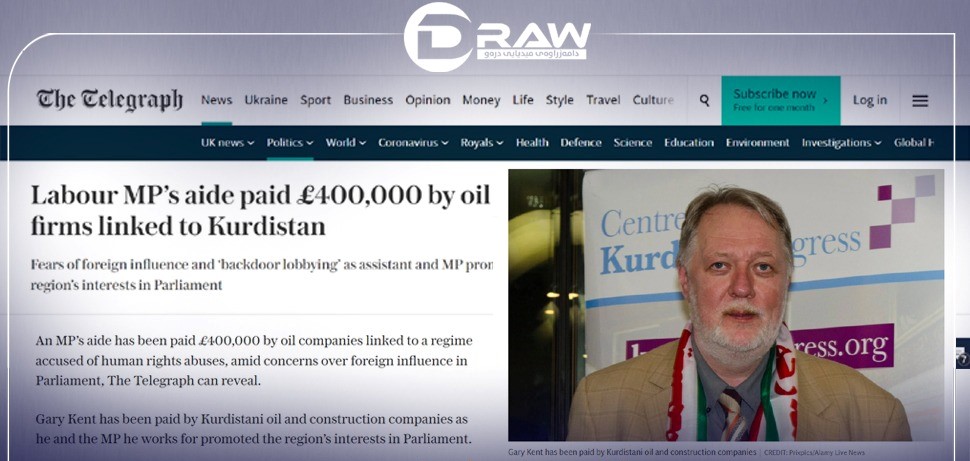Labour MP’s aide paid £400,000 by oil firms linked to Kurdistan

2022-04-10 11:15:38
The Telegraph, By Mason Boycott-Owen
An MP’s aide has been paid £400,000 by oil companies linked to a regime accused of human rights abuses, amid concerns over foreign influence in Parliament, The Telegraph can reveal.
Gary Kent has been paid by Kurdistani oil and construction companies as he and the MP he works for promoted the region’s interests in Parliament.
The aide still works for Mary Glindon, the Labour MP and whip, and is also the secretary of the Kurdistan Region in Iraq All-Party Parliamentary Group (APPG).
He has highlighted how the APPG has helped shape select committee reports and MPs’ speeches, as well as how it has secured a government trade mission to the country.
Mr Kent has also described how the group has taken more than 50 UK parliamentarians to the region over the last decades, some "several times".
Annual salary of £57,000 from Kar Group
Transparency documents show that between 2015 and last year, Mr Kent had been paid by a number of different oil and construction companies with close links to the Kurdistan Regional Government.
He had been paid an annual salary of £57,000 by Kar Group and other companies in the region, but it is understood he now runs the APPG in a voluntary capacity
Kar Group, a Kurdistani oil and construction company, has reportedly close links to the region’s government. Local media has reported that Baz Karim, the company’s president and chief executive, is a trusted adviser of Masrur Barzani, the Kurdistan Regional Government’s prime minister.
Last year, Amnesty International said Kurdistani authorities had "ruthlessly cracked down on journalists, activists and protesters exercising their right to freedom of expression, including by arbitrarily arresting and forcibly disappearing them".
Alistair Graham, the former chairman of the Committee on Standards in Public Life, questioned whether it had been appropriate for foreign companies to pay salaries to parliamentary staffers.
'Very odd affair'
Mr Graham told The Telegraph: "It’s a very odd affair. Who is he accountable to, the MP or the Kurdistan government?
"It’s a backdoor way of lobbying. I’m strongly opposed to such arrangements because there is a lack of accountability.
"It is an unacceptable way of getting access to Parliament to pressure their own commercial interests."
But Ms Glindon defended the work of the APPG, saying it had "done much to build bilateral relations with a vital ally" and that all of the donations were within Parliamentary rules.
Sponsorship for APPG delegations since 2008 and funding of the secretariat from 2014 to 2021 were declared, in full, to the parliamentary authorities," she said.
"Advisers advise but MPs decide. The APPG is run by MPs and is seen by many as having done much to build bilateral relations with a vital ally.
"It has urged economic and political reform in the Kurdistan Region, of which it has been supportive where possible and critical where necessary, as an independent cross-party group, chaired by senior Labour and Conservative MPs."
Mr Kent declined to comment.
Spotlight on lobbying by overseas governments
Lobbying and attempts to shape political decision-making by foreign governments has come under the spotlight in recent months.
Barry Gardiner, a Labour MP, faced criticism after employing the son of an alleged Chinese spy in his office. Mr Gardiner rejected any suggestion of impropriety.
Sir Lindsay Hoyle, the House of Commons Speaker, has indicated he will crack down on foreign lobbying in Parliament.
All-party parliamentary groups are set up by MPs to pursue specific interest areas. Often they receive funding from outside groups, raising questions about their roles in parliamentary discussions.
The Telegraph has found that dozens of parliamentary staff have had their salaries funded by outside bodies. Some are charities or philanthropic bodies, but others have been companies.
Mr Kent described the work of the APPG in a post on its website and in interviews.
"We helped put Kurdistan on the map by persuading Top Gear to film a programme in Kurdistan, which reached millions," Mr Kent said in 2018.
Mr Kent is currently listed as director of policy at the University of Kurdistan Hewler in Parliamentary transparency documents.
The university last year appointed Bill Rammell, a former Labour foreign office and education minister, as its new president.
Since 2014, Ms Glindon has spoken eight times in Parliament, submitted eight questions and proposed nine motions to the Commons specifically regarding Kurdistan, including on topics such as the supply of machine guns and ammunition supplies from the UK.
In 2018, Ms Glindon called on the House to welcome a deal between Baghdad and Kurdistan for an oil pipeline to export tens of thousands barrels of oil a day and "restore billions of dollars of lost revenue" to the region.
Steve Goodrich, head of research and investigations at Transparency International UK, said: "It’s particularly worrying when foreign governments are closely linked to the day-to-day running of APPGs, as this can give rise to the perception – or reality – that the group has been captured by private interests.
"In order to avoid the next big lobbying scandal, there should be much greater openness and accountability over how APPGs are run.




.jpg)

.jpg)
.jpg)